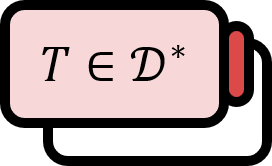Convergence in the Space of Test Functions
In the test function space, ‘convergence’ is defined in a special way. Normally, when a space $X$ is given, convergence is defined using the norm or distance defined in $X$. However, in the test function space, convergence is defined under stronger conditions to properly define and handle distributions.
Definition
Let $\Omega \subset \mathbb{R}^n$ be an open set, and $\left\{ \phi _{j} \right\}$ be a sequence of test functions. We say that $\left\{ \phi_{j} \right\}$ converges to $0$ in the sense of $\mathcal{D}(\Omega)$ if the following two conditions are satisfied, denoted as:
$$ \phi_{j} \overset{\mathcal{D}}{\to} 0 $$
(a) There exists a $K \Subset \Omega$ that satisfies $\mathrm{supp} (\phi_{j}) \subset K\quad \forall\ j$.
(b) For each multi-index $\alpha$, $D^{\alpha}\phi_{j}$ converges uniformly to $0$.
$$ D^{\alpha}\phi_{j} \rightrightarrows 0 $$
Here, $\mathrm{supp}$ refers to the support.
Explanation
The terminology may vary slightly depending on the author, but the term itself is not important.
Converges in the sense of the space $\mathcal{D}$: converge in the sense of the space $\mathcal{D}$1
Converges in $\mathcal{D}$: converge in $\mathcal{D}$2
Of course, if there’s no confusion in the context of a specific textbook or lecture, it can be simply denoted as $\phi_{j} \to 0$. According to definition (b), if it converges in $\mathcal{D}$, it also satisfies the usual meaning of convergence. The above definition can be generally written for all $\phi$ as follows, not just for $0$.
Let $\Omega \subset \mathbb{R}^n$ be an open set, and $\left\{ \phi _{j} \right\}$ be a sequence of test functions. We say that $\left\{ \phi_{j} \right\}$ converges to $\phi$ in the sense of $\mathcal{D}(\Omega)$ if the following two conditions are satisfied, denoted as $\phi_{j} \to \phi \text{ in } D(\Omega)$:
(a) There exists a $K \Subset \Omega$ that satisfies $\mathrm{supp} (\phi_{j}-\phi) \subset K\quad \forall\ j$.
(b) For each multi-index $\alpha$, $D^{\alpha}\phi_{j}$ converges uniformly to $D^{\alpha} \phi$. $$ D^{\alpha}\phi_{j} \rightrightarrows D^{\alpha}\phi $$
